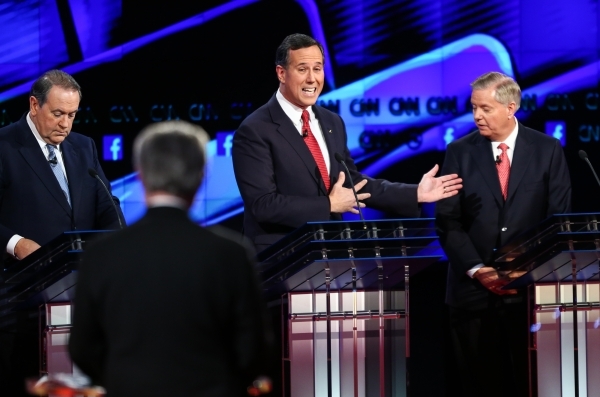Republican candidates confront regime change at Las Vegas debate
To topple foreign regimes or to not topple foreign regimes. That is the question.
Or at least that was one of the questions in the CNN Republican debate Tuesday night at The Venetian hotel-casino. And it produced wildly disparate answers among the candidates.
At the heart of the issue was the question of whether the United States should make common cause with bad, sometimes evil people if those people happen to be fighting the mutual enemies of this country. Let's say the moral dimensions of the issue were not fully explored.
Businessman Donald Trump, for example, said he warned back in 2003 and 2004 that toppling Iraqi dictator Saddam Hussein would destabilize the country and lead to chaos. Many others at the time argued that Hussein was "in his box" and that it was foolish to send troops in. Turns out, they were right.
But leaving Hussein in power — even as a hedge against al-Qaida and the jihadists who later would become ISIL — meant allowing the continued abuse of the Iraqi people, aggression against the Kurds and belligerence against American pilots enforcing southern and northern no-fly zones.
Worth it? A complex moral question, the outworking of which we're still witnessing.
(Notably, not a single candidate — even the most libertarian, isolationist such as Sen. Rand Paul, R-Ky. — would bring up the fact that the invasion of Iraq was occasioned by the false assertion that Hussein possessed weapons of mass destruction. But that's another rant for another day. It was especially notable that former Florida Gov. Jeb Bush — whose brother former President George W. Bush pushed hardest for the Iraq invasion — said the key to waging war in the Middle East is to have a strategy to get in and a strategy to get out, seemingly an implicit criticism of his brother's war effort, which languished for years after the initial successful invasion.)
It was Paul who argued most vociferously against regime change in foreign countries, noting the chaos, uncertainty and bad consequences that so often results from American efforts to remake political maps. That includes the rise of radical jihadist movements in places such as Syria. "It's not a good idea," Paul declared flatly, adding later, "I think it's a huge mistake."
And Trump joined him, lamenting the trillions that have been spent on waging war in the Middle East that could otherwise have been spent on American infrastructure badly in need of repairs. "And for what? It's not like we have had victory," Trump said.
He was immediately criticized by former Hewlett Packard CEO Carly Fiorina, who accused him of speaking with President Barack Obama's voice. "I'm amazed to hear that from a Republican presidential candidate," she said.
Dr. Ben Carson was asked the question bluntly: Are people better off living under dictators (as opposed to the unpredictable consequences when those dictators are toppled)? He replied that no one was better off living under dictators, but that America needed to see to its own interests first before trying to arrange more amenable foreign partners, which sounds a lot like the Trump position.
By the way, the biggest boos of the night came from the crowd when talk radio host Hugh Hewitt essentially asked Carson if he had the stomach for ordering attacks in which he knows civilians (including children) would be killed. Carson demurred on his answer, but the question is a relevant one nonetheless. No matter how much we try to avoid civilian casualties — even avoiding attacking legitimate targets because the non-combatant death toll would be too high — there will always be the possibility that innocent people will die. How any candidate who wants to be commander in chief wrestles with that question is relevant.
Carson was adamant about one form of regime change, however, saying the U.S. must uproot the ISIL caliphate in order to remove any legitimacy from the group's efforts at global jihad.
Ohio Gov. John Kasich took the pro-regime chance stance, declaring that Syrian President Bashar al-Assad had to be removed from power. He and New Jersey Gov. Chris Christie also counseled a stronger stance against Russia, with Kasich declaring we should "punch Russia in the nose" and Christie declaring he'd unhesitatingly shoot down Russian jets in a Syrian no-fly zone.
"I think if you're in favor of World War III, you have your candidate," Paul shot back. "It's recipe for disaster. It's recipe for World War III."
But Christie refused to back down, asking how an isolationist stand has worked out so far: In Syria, hundreds of thousands are dead and refugees are making their way to Europe and the United States, raising concerns about terrorism in their wake. Al-Assad has been credibly accused of using chemical weapons against rebels fighting his regime, and he has ties to Iran and Russia. (Yet, al-Assad is just as committed to fighting ISIL as the U.S., complicating considerably the calculus in the region.)
— Steve Sebelius is a Las Vegas Review-Journal political columnist and co-host of the show "PoliticsNOW," airing at 5:30 p.m. Sundays on 8NewsNow.
Follow him on Twitter (@SteveSebelius) or reach him at 702-387-5276 or ssebelius@reviewjournal.com.












